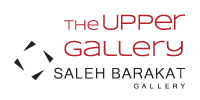EXHIBITIONS
For Youssef Aoun, his multi-dimensional work combines abstraction with natural and mineral products, making use of a range of textured materials, including acrylic, sand and marble powder, which he blends into lines, colours and shapes.
In his own words, his ‘mysterious spiritual and sensual universe opens a door to a subtle merger of the body into nature’, noting that in his work he has undertaken ‘…an inner migration, drawing and painting in the image of migratory birds that do not need to see their destination’.
To an outside eye the paintings of Youssef Aoun might speak first to extremities, his large canvases full of contrast, blackness a contrast to swathes of white. Yet for Aoun, black is not a signifier of darkness, nor white of the light. His use of these high contrast tonalities serves another purpose.
Nonetheless, drama appears in this work, intrigue, a kind of chiaroscuro without the reprieve of three-dimensional form, light source, this or that reality. Throughout this body of work affect emerges through contrast playing out through tone as well as texture, the combination forming a grit, hardness, crystalline quality, held within the strong play of distinct layering, colour and tone.
Youssef Elias Aoun was born in 1965 in Kfarwe, South Lebanon and lives in Beirut. He holds a Higher Degree from the Lebanese University, Faculty of Fine Art (1989) and a Masters in Fine Arts (Painting and Printing techniques: lithography and etching) from the Lebanese Academy of fine Arts (ALBA) (2005). From 1990 until the present, he has been a teacher at the Lebanese Academy of Fine Arts (ALBA), and from 1999 until 2005 was a teacher at the Lebanese American University, Faculty of Fine Arts, Beirut.
His many solo exhibitions include presentations at the Lebanese Academy of Fine Arts (ALBA), Lebanon (2015); Sultan Gallery, Kuwait (2012/2013); Agial Art Gallery, Beirut (2012); Mers-Les-Bains, France (2009) and Sultan Gallery, Kuwait (2007). He has also been part of numerous group exhibitions including, Galerie Cheriff Tabet et Sherttowear Khan Sacy (2025); L’Art Abstrait au Liban, Saleh Barakat Gallery, Beiteddine, Lebanon (2023) and Nour Ballouk Gallery, Grand Opening, Lebanon (2023). Youssef has been the recipient of a number of awards including the Sharjah Biennial, U.A.E. (Prize of the Jury 1995) and XVI Autumn Hall, Sursock Museum, Lebanon (Dorothy Salhab Kazemi Prize for Young Artists 1991 and 1995) and has organised many workshops and symposia, as well as a number of curatorial projects.
His work is held in a number of private collections including Sursock Museum, Lebanon; The National Museum, U.A.E; Bibliothèque Nationale de France, France; National Museum, Dubai; Émirats Arabes Unis., Ministry of Culture, Lebanon; National Museum of Qatar and Audi Bank, Lebanon.
Drawing is central to Bassam Khawaji’s practice, used primarily as a preliminary tool to put out into the world what is inside, and to gain a formal relation to his internal world through that process. His compositions in paint, as well as the relief works of wire and plaster on display in the Upper Gallery, are shaped through this systematic drawing process, the white reliefs highlighting the simplicity of form before colour, when shape is the key axis. Pulling away from the paper but not yet emerging onto canvas, wire lines become simple forms, encased then in thick white coverings. These works might be first sketches, and yet they speak a language that is complete, formed from the manipulation of wire which is frame and support as well as composition and line.

In the world-making of Doreen El Zein, apparently peaceful shapes morph easily towards form, but rarely reach a recognisable state. A fluid translucence pervades the whole, unconcerned by shifts in colour and tone, guided rather by changes in temperature, the swaying depths of warmth and cold.
Indeed, in the spaces that she shapes between the forms of fire and water, a contrast begins to emerge, a movement between warm and cool, a heat that burns at the base or the centre, licking the edges of caves and watery hollows
In this way, Zein’s gentle painterly expression is tempered by an intensity of contrast, revealing its depth over time, through looking and allowing spaces to exist inside and around each other, and through this gaining a sense of her process. If her gift is in the continual morphing of form, the unending wonder of what a form might reach, she comes to terms with her peace in the relationship with intensity, the darkness inside the light.
What water quenches those fires, or refuses to let them die, what peace is disturbed by muted, mutable darkness.
Beginning her career in special paint effects and furniture finishing, her work has evolved to include painting and sculpture in mixed media with a focus on paintings developed through densely layered multi-media washes that at times give way to transparent overlapping veils of colour expressing her inner world.
She held her first solo exhibition at Agial Art Gallery in Beirut in 2017 and has participated in various group exhibitions including Visual Art Forum, Unesco Palace (2016); Lebanese American University Fine Arts Alumni Biennale, Beirut, Lebanon (2016); Prolekult, American University of Beirut, Beirut Lebanon, 2016; Vento d Oriente, Venice Italy, 2016; Rebirth of a Nation, Beirut Exhibition Center (2015); International Women’s Day, Haigazian University Art Center, Beirut, Lebanon (2013); Hamazkayin Gallery (2012, 2016); Schizzo gallery, Beirut, Lebanon (2014) and Rochane art gallery, Beirut, Lebanon (2012). Her work is held in a number of private collections.

